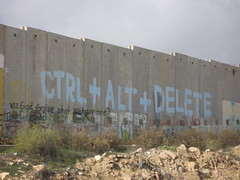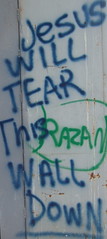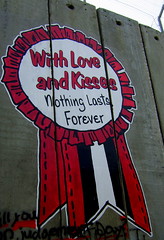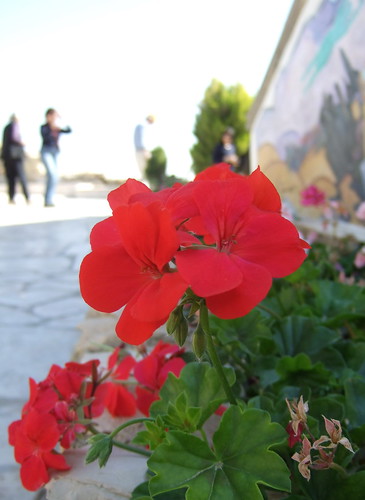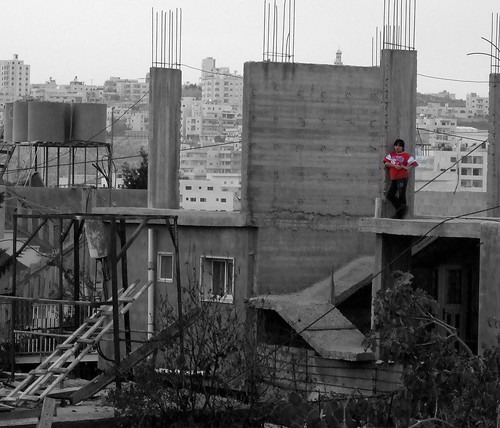Like me, you may have been watching in horror at the escalating crisis in Gaza. The death toll is already around 300, with over 1,400 wounded. A Palestinian doctor in Gaza has told the BBC nearly all the casualties he had seen overnight and on Monday had been civilians.
It was only last month that I was standing on the border of the Gaza strip looking out at the Gaza city skyline while the sun shone down on the Mediterranean sea.
I can remember the moment we sat with Israeli's in a Jewish kibbutz in Sderot. As we arrived, our host told us that if we hear a siren with the words "COLOUR RED", we had about 40 seconds to rush to the bomb shelter. I later found out that it was nearer 15 seconds and the announcement is in Hebrew. Sderot has been one of the main targets of Qassam rocket attacks from Gaza.
Whilst we listened to their stories of community life, less than a mile from the Gaza border, we heard a loud rushing noise as an F16 fighter plane flew directly overhead. Our speaker stopped talking and the whole room fell silent. During our time at the kibbutz we heard several other jets flying overhead. Our Jewish friends told us that this activity from the Israeli Air Force was not normal. At the time we discussed whether these were intimidation tactics by the Israeli Defense Force towards the Gazans but in hindsight it seems that they may have been preparing for the recent attacks.
When asked whether they felt protected by their government, the Israelis said "No" and furthermore that the Israeli government needed holding to account by the US and international community.
The ongoing rocket attacks from Hamas have been used to justify the latest military campaign. The Israeli Defence Minister Ehud Barak has said that the aim of the strikes is to "stop rockets and missiles being launched on Israel". However it is already clear that the recent attacks on Gaza will not only strengthen the resolve of Hamas to destroy Israel it will serve to increase the bombardment of rockets into Israel. There has even been talk of Hamas resuming the campaign of suicide bombing.
Our Israeli friends are now undoubtedly less safe as a result of the recent Israeli military campaign. I only hope and pray that as Israel prepares the next stage of the attacks it doesn't seek to recapture the Gaza strip or indeed trigger a third Intifada.
Please sign the petition calling for an immediate ceasefire in Gaza or follow the other actions on Rachel's blog post.
Monday, 29 December 2008
Gaza
 I have been horrified to witness the unravelling of the situation in the Gaza Strip over the last two days. 300 hundred people are dead. Israel is bombing an enclosed territory of 1.5million people, many of whom are refugees.
I have been horrified to witness the unravelling of the situation in the Gaza Strip over the last two days. 300 hundred people are dead. Israel is bombing an enclosed territory of 1.5million people, many of whom are refugees.Please take action by:
- Writing to your MP through www.writetothem.com asking the UK government to put pressure on Israel and Hamas to stop the violence.
- Visit http://www.avaaz.org/en/gaza_time_for_peace/?cl=161620838&v=2605 and sign the petition calling for an immediate ceasefire in Gaza.
- Attend a demonstration - some information here
- Boycott Israeli goods, and tell them you are doing so by writing to the Israeli ambassador:
Ambassador Ron Prosor
2 Palace Green
London
W8 4QB
2 Palace Green
London
W8 4QB
(the photograph above was taken in November 08 from a Kibbutz close to the Gaza border - it shows Gaza City in the distance)
Tuesday, 16 December 2008
A hope for Christmas
This morning as I cycled to work through the freezing fog, I was thinking about the homeless people who I pass every day on my way to work.
This time of year is miserable: the freezing weather is a sever health hazard for many homeless people, and a couple of years ago a homeless man in my parents home town froze to death in a park, after sleeping there all night. Death is a daily reality for many of them during this time of year. When working at Leamington Christian Mission, a soup kitchen for the homeless, I heard about how some would commit crimes over the winter in the hope of being caught: so they could get a hot meal and roof over the head; even if it was just for one night.
When I arrived at work after making myself a hot drink and starting to defrost from my ride, I sat down to read my emails and came across the Women’s Organisation for Political Prisoners, about many (mostly) Palestinian women who are being held in Israeli jail and the treatment they receive, which by all accounts is horrendous.
Over the last few weeks I have also been hearing about the plight of the Shministim, young Israelis who are refusing to serve in the Israeli Defence Forces, many of whom have been sent to prison because of their conscientious objection. These teenagers – yes, teenagers – are showing immense courage against a huge amount of opposition, including much from their friends and family, as well as the authorities. One of the Shministim, Yuval Oron-Ofir, yesterday was sentenced to this third term for refusing to serve.
This takes me back to a conversation we had while staying at Dheisheh Refugee Camp where our guide, who will remain anonymous as it is illegal for him to talk to us, described how the community there worked together to look after its members. He mentioned how there were no homeless people in the camp, as people would always provide for them to make sure they had a roof over their head. In a place like Palestine where people have so little but give so much, it shames me to think of the huge number of homeless people that we fail to provide for across Oxford, and the UK.
I hope this Christmas we can all keep those who are not as fortunate as us in our hearts and minds: whether they are in England or elsewhere in the world.
This time of year is miserable: the freezing weather is a sever health hazard for many homeless people, and a couple of years ago a homeless man in my parents home town froze to death in a park, after sleeping there all night. Death is a daily reality for many of them during this time of year. When working at Leamington Christian Mission, a soup kitchen for the homeless, I heard about how some would commit crimes over the winter in the hope of being caught: so they could get a hot meal and roof over the head; even if it was just for one night.
When I arrived at work after making myself a hot drink and starting to defrost from my ride, I sat down to read my emails and came across the Women’s Organisation for Political Prisoners, about many (mostly) Palestinian women who are being held in Israeli jail and the treatment they receive, which by all accounts is horrendous.
Over the last few weeks I have also been hearing about the plight of the Shministim, young Israelis who are refusing to serve in the Israeli Defence Forces, many of whom have been sent to prison because of their conscientious objection. These teenagers – yes, teenagers – are showing immense courage against a huge amount of opposition, including much from their friends and family, as well as the authorities. One of the Shministim, Yuval Oron-Ofir, yesterday was sentenced to this third term for refusing to serve.
This takes me back to a conversation we had while staying at Dheisheh Refugee Camp where our guide, who will remain anonymous as it is illegal for him to talk to us, described how the community there worked together to look after its members. He mentioned how there were no homeless people in the camp, as people would always provide for them to make sure they had a roof over their head. In a place like Palestine where people have so little but give so much, it shames me to think of the huge number of homeless people that we fail to provide for across Oxford, and the UK.
I hope this Christmas we can all keep those who are not as fortunate as us in our hearts and minds: whether they are in England or elsewhere in the world.
Monday, 8 December 2008
 The destruction of olive trees
The destruction of olive trees “One of the collective punishments which not only harm us economically but also and above all strike at our symbols is the destructive on olive trees. This crime against nature wounds our very soul. The sight of destroyed olive groves is incredibly painful.
Olive trees are the heart of Palestine. They symbolise the country, our way of life, the ties between people and land. We have been cultivating olive trees for centuries. The production of olive oil is sill an important economic activity. It is illegal to uproot olive trees. Despite that, entire olive groves are being destroyed by excavators and tractors.  Sometimes the trees are just mangled or topped, the explanation being that the security of the settlers requires it – the security of settlers in settlements which have been built illegally on Palestinian land. This hostile act is often also carried out as a punishment. If a boy standing in a field which does not belong to him throws a stone, the owners of the field lose their trees.”
Sometimes the trees are just mangled or topped, the explanation being that the security of the settlers requires it – the security of settlers in settlements which have been built illegally on Palestinian land. This hostile act is often also carried out as a punishment. If a boy standing in a field which does not belong to him throws a stone, the owners of the field lose their trees.”
 Sometimes the trees are just mangled or topped, the explanation being that the security of the settlers requires it – the security of settlers in settlements which have been built illegally on Palestinian land. This hostile act is often also carried out as a punishment. If a boy standing in a field which does not belong to him throws a stone, the owners of the field lose their trees.”
Sometimes the trees are just mangled or topped, the explanation being that the security of the settlers requires it – the security of settlers in settlements which have been built illegally on Palestinian land. This hostile act is often also carried out as a punishment. If a boy standing in a field which does not belong to him throws a stone, the owners of the field lose their trees.”Sumaya Farhat-Naser Daughter of the Olive Trees: A Palestinian Woman’s Struggle for Peace, pages 24 and 25.
Wednesday, 3 December 2008
Handala: The Refugee Child

Art is the ultimate defiance of violence. To respond by being creative when faced with violence is to refuse to meet violence on its own terms.
Violence occurs only when creative thinking is exhausted. Creativity, on the other hand, denies violence its power, dismantles its preconceptions, and defeats its aims.
Visiting the West Bank I was struck by the abundance of creativity. Graffiti on the separation wall is purposeful and often beautiful, a stark contrast to the mindless scrawls that adorn railway bridges across the UK.
A house in the Jerusalem suburb of Anata demolished four times by Israeli bulldozers has each time been rebuilt, colourfully repainted and its restful garden lovingly restored. The family who own the house can no longer face the emotional trauma of living there (a fifth demolition order has been placed on the house), so it has been instated as a peace centre, and serves as a hub of peace education for Palestinians and people visiting Palestine.
At a farm where they cannot get a permit to build on their own land, they build under the land instead, constructing living quarters, workshop rooms, and offices in underground caves.

One creative symbol in particular has become the life blood of Palestinians. The Handala - a cartoon Palestinian refugee child - is seen all around Palestine, etched on university lockers, painted on the walls of homes in refugee camps. The Handala has come to represent the plight of the 7 million Palestinian refugees around the world, their search for justice, and their longing to return home.

Handala's original creator, Palestinian cartoonist, Naji Al-Ali, wrote:
"The child Handala is my signature, everyone asks me about him wherever I go. I gave birth to this child in the Gulf and I presented him to the people. His name is Handala and he has promised the people that he will remain true to himself. I drew him as a child who is not beautiful; his hair is like the hair of a hedgehog who uses his thorns as a weapon. Handala is not a fat, happy, relaxed, or pampered child. He is barefooted like the refugee camp children, and he is an icon that protects me from making mistakes. Even though he is rough, he smells of amber. His hands are clasped behind his back as a sign of rejection at a time when solutions are presented to us the American way.In 1987 Naji Al-Ali was assassinated in London, outside the office of the Kuwaiti newspaper for which he drew political cartoons. He was 50 years old.
"Handala was born ten years old, and he will always be ten years old. At that age, I left my homeland, and when he returns, Handala will still be ten, and then he will start growing up. The laws of nature do not apply to him. He is unique. Things will become normal again when the homeland returns.
"I presented him to the poor and named him Handala as a symbol of bitterness. At first, he was a Palestinian child, but his consciousness developed to have a national and then a global and human horizon. He is a simple yet tough child, and this is why people adopted him and felt that he represents their consciousness."
Monday, 1 December 2008
An Angel Sighting in Beit Sahour
We arrived in Beit Sahour, a town just outside of Bethlehem - the Shepherd's Fields - where we stayed with host families contacted through the Alternative Tourism Group. Our Palestinian hosts were a Christian family - Hanen and Sami, with their daughter Jane. We arrived in time for tea - made with sage - and later a beautifully prepared meal of chicken, rice with almonds and yoghurt, as well as home-prepared pickles.
We talked until late. Jane, whose English was very good, spoke about her life in Beit Sahour. She has four sisters who are now all married, two living in Jordan. She showed us the photographs of the weddings - for the most recent she was the bridesmaid - and the pictures of her neices and nephews.
Jane works at the Applied Research Institute, Jerusalem (ARIJ) which is an environmental research institute and particularly looks at the environmental cost of the occupation. We visited ARIJ the following day - and they have such a wealth of information - their maps are particularly useful for understanding the occupation.
A message that came across very clearly from Jane, and from other young Palestinians we had the privilege to meet, was the message 'we are tired'. 'Talk about our feelings' we were told. 'Make people see us as humans'.
I wish I had the words.
When I asked about angel-sightings in the neighbourhood, unfortunately our hosts had not seen any, but they told us a local legend of cursed gold hidden in the caves which Jane and her sisters used to play in as children. This gold, we were told, accounted for the few rich, crazy people in the locality.
We talked until late. Jane, whose English was very good, spoke about her life in Beit Sahour. She has four sisters who are now all married, two living in Jordan. She showed us the photographs of the weddings - for the most recent she was the bridesmaid - and the pictures of her neices and nephews.
Jane works at the Applied Research Institute, Jerusalem (ARIJ) which is an environmental research institute and particularly looks at the environmental cost of the occupation. We visited ARIJ the following day - and they have such a wealth of information - their maps are particularly useful for understanding the occupation.
A message that came across very clearly from Jane, and from other young Palestinians we had the privilege to meet, was the message 'we are tired'. 'Talk about our feelings' we were told. 'Make people see us as humans'.
I wish I had the words.
When I asked about angel-sightings in the neighbourhood, unfortunately our hosts had not seen any, but they told us a local legend of cursed gold hidden in the caves which Jane and her sisters used to play in as children. This gold, we were told, accounted for the few rich, crazy people in the locality.
Subscribe to:
Posts (Atom)



